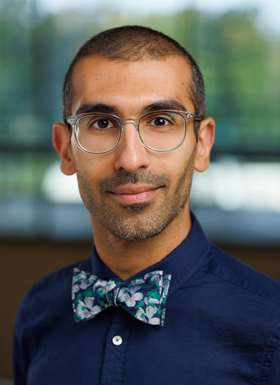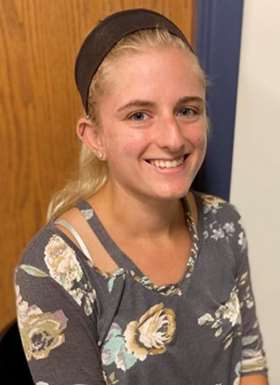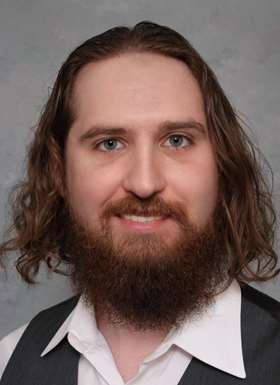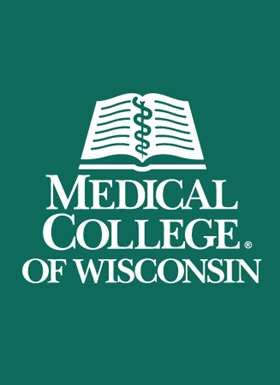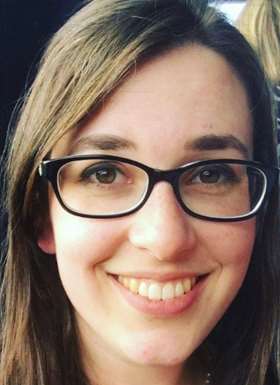
Caitlin O'Meara, PhD
Associate Professor
Locations
- Cardiovascular Research Center
Contact Information
Education
PhD, Medical College of Wisconsin, 2011
Research Interests
Methodologies and Techniques
- Echocardiography
- Cardiac surgeries and phenotyping- mammalian models
- Histology
- Microscopy- fluorescent, confocal
- Flow cytometry
- FACS sorting
- Polymerase Chain Reaction
- Molecular cloning
- Western blotting
- Cell culture- primary cardiac cells
- RNA sequencing (bulk and single cell RNA sequencing)
- Genetics/Genomics
Research Interests
Overarching concept:
Higher organisms such as zebrafish and neonatal mice are capable of complete heart regeneration following partial amputation. Although adult humans and adult mice lack this regeneration response, there is great interest in understanding how heart regeneration can occur in lower organisms so that we can activate pro-reparative processes in humans to better treat patients following myocardial infarction. My lab is interested in understanding the cell biology and molecular pathways that facilitate heart regeneration, repair, and cardiomyocyte cell cycle activity.
Interleukin 4/13 signaling:
Cytokines and growth factors play a significant role in the initiation of tissue and organ regeneration in large part by directly stimulating proliferation of resident cells, or by recruitment and activation of wound healing inflammatory cells. The type II cytokines Interleukin 4 (IL4) and Interleukin 13 (IL13) are well known to mediate type II immunity, but also can signal to non-hematopoietic cell types. Our lab is interested in studying the various cell types in the heart that respond to IL4/13 during homeostasis and post injury, as well as the cell types producing these cytokines. Overall, IL4/13 signaling in the heart improves the reparative response and cardiac outcomes post injury, therefore understanding the mechanism(s) by which these cytokines improve cardiac function could lead to new therapeutic strategies for treating heart failure.
Cytoarchitectural proteins in cardiomyocyte function:
Cardiac regenerative approaches aimed to drive proliferation of CMs have shown great promise in recent years. However, there is currently poor understanding as to how cell structural changes are regulated to promote cell cycle re-entry, and importantly the factors that facilitate re-integration of CMs into the functional myocardium. This latter point is particularly significant as driving CM cell cycle itself can lead to adverse phenotypes such as heart failure or arrhythmia. Considering the importance of the intercalated disc (ICD) and CM cytoskeletal structure in regulating cell signaling and maintaining cardiac function, we aim to understand the proteins that control CM cytoarchitecture and re-establishment of ICD during cardiac development, regeneration, and repair.
Genetic determinants underlying cardiac repair:
The physiological response to cardiac injury such as myocardial infarction is highly variable in humans. Emerging literature has identified several cardiac cell types that are thought to protect individuals from adverse outcomes following injury, and even promote some degree of myocardial regeneration. Specifically, emerging evidence demonstrates that cardiac resident macrophage populations promote reparative healing in the context of cardiac injury. Macrophage subtypes are present in the steady state heart prior to injury, are present at variable frequencies across genetically inbred rodent strains, and are easily quantifiable. We leverage genetically diverse rat models to determine frequency and sub-type of tissue resident cardiac macrophages in the steady state heart and determine how these populations relate to outcomes after myocardial injury. This project is in collaboration with Dr. Michaela Patterson’s lab.
Training and Mentoring
A priority of mine is high quality training of the next generation of scientists. Graduate students and postdoctoral in the O’Meara lab have been recipients of independent NIH F31 and F32 grants and have been awarded placement on competitive predoctoral and postdoctoral T32 training grants. We are currently recruiting graduate students and postdoctoral fellows to work on highly collaborative and innovative cardiac repair research projects.
Publications
-
Cardiac dysfunction and altered gene expression in acid ceramidase-deficient mice.
(Kleynerman A, Rybova J, McKillop WM, Dlugi TA, Faber ML, Fuller M, O'Meara CC, Medin JA.) Am J Physiol Heart Circ Physiol. 2025 Jan 01;328(1):H141-H156 PMID: 39665198 PMCID: PMC12233101 SCOPUS ID: 2-s2.0-85213996641 12/12/2024
-
(Swift SK, Purdy AL, Buddell T, Lovett JJ, Chanjeevaram SV, Arkatkar A, O'Meara CC, Patterson M.) Cell Rep Methods. 2024 Sep 16;4(9):100860 PMID: 39255794 PMCID: PMC11440799 SCOPUS ID: 2-s2.0-85204511356 09/11/2024
-
(Gural B, Kirkland L, Hockett A, Sandroni P, Zhang J, Rosa-Garrido M, Swift SK, Chapski D, Flinn MA, O'Meara CC, Vondriska TM, Patterson M, Jensen BC, Rau CD.) bioRxiv. 2024 Aug 10 PMID: 39149394 PMCID: PMC11326268 08/16/2024
-
Runx1 is sufficient but not required for cardiomyocyte cell-cycle activation.
(Akins KA, Flinn MA, Swift SK, Chanjeevaram SV, Purdy AL, Buddell T, Kolell ME, Andresen KG, Paddock S, Buday SL, Veldman MB, O'Meara CC, Patterson M.) Am J Physiol Heart Circ Physiol. 2024 Aug 01;327(2):H377-H389 PMID: 38847758 PMCID: PMC11442100 SCOPUS ID: 2-s2.0-85199812831 06/07/2024
-
Physiological role and mechanisms of action for a long noncoding haplotype region.
(Xue H, Mishra MK, Liu Y, Liu P, Grzybowski M, Pandey R, Usa K, Vanden Avond MA, Bala N, Alli AA, Cowley AW, Qiu Q, Greene AS, Rao S, O'Meara CC, Geurts AM, Liang M.) bioRxiv. 2024 May 18 PMID: 39282460 PMCID: PMC11398485 09/17/2024
-
Global IL4Rα blockade exacerbates heart failure after an ischemic event in mice and humans.
(Alvarez-Argote S, Almeida VA, Knas MC, Buday SL, Patterson M, O'Meara CC.) Am J Physiol Heart Circ Physiol. 2024 May 01;326(5):H1080-H1093 PMID: 38426866 PMCID: PMC11380969 SCOPUS ID: 2-s2.0-85190400498 03/01/2024
-
IL-13 promotes functional recovery after myocardial infarction via direct signaling to macrophages.
(Alvarez-Argote S, Paddock SJ, Flinn MA, Moreno CW, Knas MC, Almeida VA, Buday SL, Bakhshian Nik A, Patterson M, Chen YG, Lin CW, O'Meara CC.) JCI Insight. 2024 Jan 23;9(2) PMID: 38051583 PMCID: PMC10906228 SCOPUS ID: 2-s2.0-85183312687 12/06/2023
-
Cardiomyocyte ploidy is dynamic during postnatal development and varies across genetic backgrounds.
(Swift SK, Purdy AL, Kolell ME, Andresen KG, Lahue C, Buddell T, Akins KA, Rau CD, O'Meara CC, Patterson M.) Development. 2023 Apr 01;150(7) PMID: 36912240 PMCID: PMC10113957 SCOPUS ID: 2-s2.0-85152488769 03/14/2023
-
(Puzyrenko A, Jacobs ER, Padilla N, Devine A, Aljadah M, Gantner BN, Pan AY, Lai S, Dai Q, Rubenstein JC, North PE, Simpson PM, Willoughby RE, O'Meara CC, Flinn MA, Lough JW, Ibrahim EH, Zheng Z, Sun Y, Felix J, Hunt BC, Ross G, Rui H, Benjamin IJ.) J Am Heart Assoc. 2023 Feb 21;12(4):e027990 PMID: 36789856 PMCID: PMC10111490 SCOPUS ID: 2-s2.0-85148479620 02/16/2023
-
Interleukin-13 and its receptor are synaptic proteins involved in plasticity and neuroprotection.
(Li S, Olde Heuvel F, Rehman R, Aousji O, Froehlich A, Li Z, Jark R, Zhang W, Conquest A, Woelfle S, Schoen M, O Meara CC, Reinhardt RL, Voehringer D, Kassubek J, Ludolph A, Huber-Lang M, Knöll B, Morganti-Kossmann MC, Brockmann MM, Boeckers T, Roselli F.) Nat Commun. 2023 Jan 13;14(1):200 PMID: 36639371 PMCID: PMC9839781 SCOPUS ID: 2-s2.0-85146272971 01/14/2023
-
Myofibroblast Ccn3 is regulated by Yap and Wwtr1 and contributes to adverse cardiac outcomes.
(Flinn MA, Alvarez-Argote S, Knas MC, Almeida VA, Paddock SJ, Zhou X, Buddell T, Jamal A, Taylor R, Liu P, Drnevich J, Patterson M, Link BA, O'Meara CC.) Front Cardiovasc Med. 2023;10:1142612 PMID: 36998974 PMCID: PMC10043314 04/01/2023
-
Interleukin 4/13 signaling in cardiac regeneration and repair.
(Bakhshian Nik A, Alvarez-Argote S, O'Meara CC.) Am J Physiol Heart Circ Physiol. 2022 Nov 01;323(5):H833-H844 PMID: 36149768 PMCID: PMC9602781 SCOPUS ID: 2-s2.0-85140273361 09/24/2022
O'Meara Lab Staff
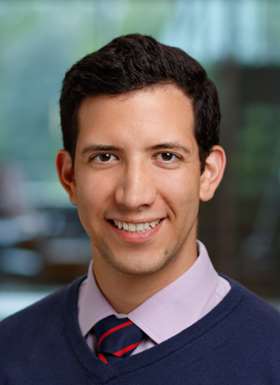
Santiago Alvarez, MD
Graduate Student
My research interest focuses on cardiac recovering, tissue remodeling and heart failure development after acute cardiac injury, looking particularly at the role of interleukin 4 and 13 in cardiac macrophages in promoting cardiac regeneration and improving outcome.
